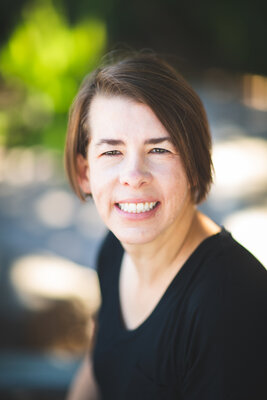
Sari Fordham
Creative Nonfiction
Photo credit: Natan Vigna
Sari Fordham teaches creative writing at La Sierra University. Her work has appeared in Brevity, Green Mountains Review, Booth, Passages North, and The Chattahoochee Review, among others. In her memoir Wait for God to Notice, she has written about her time in Uganda. She lives in Riverside, California, with her husband and daughter. You can visit her at www.sarifordham.com.
My Father Thinks Danger Is Beautiful
He swims in the Indian Ocean as the tide rolls in and returns to the guest house dripping. “I thought I was going to drown,” he says, sounding invigorated.
We’re a missionary family—first in Uganda, then Kenya. In the dining room, my father grades papers and my mother writes letters. Together, they cook, read, gossip about missionaries. But when a green mamba dangles from a branch, he steps closer, as she pulls me and my sister Sonja back.
At Christmas, we hike in the foothills of Mount Kenya. The air is cool and fog hangs from the white sky. I drag a stick through the mud, while my father points to a pile of wet dung and then another and another. “Let’s find some buffalo,” he says.
Cape buffalo weigh over a thousand pounds and are notoriously cranky. We’ve seen them from the car as we look for more captivating animals: elephants, lions, giraffes, or cheetahs.
My mother shakes her head no, her mouth the line of a needle. She will not try to stop him today, but neither will she follow behind, grousing. She will wait beside the hedge that runs up over the hill and disappears, and because I’m the daughter most like her, I will stay, too. We are the makers of things. We find satisfaction from the objects that arise from our hands. I cannot understand the chances my father takes. Each time he gets too close to a crocodile, I nearly weep.
The adventurers vanish over the hill, and we stand and talk. I’m too young for my mother to tell me what she’s really thinking, and so we chat about something inconsequential and watch for them to return, as they likely will, without having seen anything besides the grass and the sky and the dung. Ten minutes and then rumbling. We hush up fast and my mother reaches for my hand. We’re standing beside the hedge as the first body thunders past, separated from us by green. More come. A small herd. There’s a symphony of snorts, a sloshing of feet through mud, grunts and growls, but mostly the huff of many buffaloes breathing hard. The air smells feral, electric, and then, everything is still. A bird calls. We look at each other and laugh and laugh. We cannot stop laughing. We—the sensible ones—are shot through with something unexpected and wild.
We are invigorated.
“ My daughter is always asking me to tell stories about my childhood in Uganda and Kenya, and I tend to tell the same stories over and over. One day, though, my mind bumped into this one. As soon as I thought about it, I could feel the brisk air of the mountain and smell those buffaloes galloping past. When I told my daughter the story, I leaned into the humor of it because of course it wasn't happenstance that the buffalo came charging down the hill. They were trying to avoid my dad and sister. But as I started writing this piece, I was struck by how exciting that moment was for my mother and me. Terrifying, sure, but in the best possible way. ”
